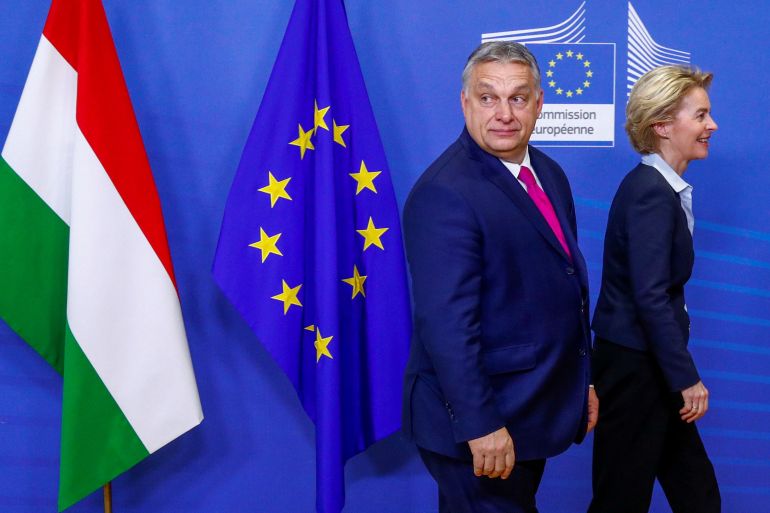EU holds up billions in aid for Hungary amid tug-of-war over Ukraine
PM Viktor Orban promises to veto proposal on Kyiv’s EU membership as EU chief urges support for ‘strong’ Ukraine.

The European Union’s executive will wait to unlock billions in development aid for Hungary from the bloc’s shared budget amid a deepening tug-of-war between the EU and Prime Minister Viktor Orban’s administration over support for Ukraine.
The European Commission said on Wednesday that it is waiting for a final step from Hungary to unlock 10 billion euros ($10.8bn) that was frozen over concerns that Orban had damaged democratic checks and balances.
Keep reading
list of 3 itemsHungary signals veto of Ukraine EU membership talks
Hungary, Poland, Slovakia to continue own bans on Ukraine grains
The commission said Hungary’s latest judicial reforms must first be published in the country’s official journal to be fully enacted, which would then allow the executive body to unfreeze the funds.
The EU was earlier expected to unlock the money to help sway Orban, who has threatened to veto Ukraine’s possible EU membership ambitions. But a senior Orban aide then demanded up to 30 billion euros ($32.4bn) in frozen aid be released, Bloomberg reported.
Orban told Hungary’s National Assembly on Wednesday that he would block a proposal to start talks on Ukraine’s EU membership at a summit in Brussels on Thursday and Friday.
Ukraine’s bid for membership requires a unanimous decision by the leaders of all 27 EU nations.
Orban, who boasts strong ties with Russian President Vladimir Putin, told lawmakers that bringing Ukraine into the EU would have unforeseeable consequences.
“We are interested in a peaceful and prosperous Ukraine, but this requires the establishment of peace as quickly as possible and a deliberate deepening of the strategic partnership,” Orban said. “Everything has its appointed time, but the time for Ukraine’s membership in the European Union has not yet come.”
Distrust of Orban has been running high in Brussels after bitter run-ins during his 13 years in power over the rights of gay people and migrants in Hungary as well as tightening state controls over academics, the courts and media
A ‘strong’ Ukraine
Addressing members of the European Parliament on Wednesday, commission President Ursula von der Leyen urged leaders to back massive financial aid for Ukraine and Kyiv’s ambitions for membership talks.
“We must give Ukraine what it needs to be strong today, so it can be stronger tomorrow at the table when it is negotiating a long lasting and just peace,” she said.
Besides Ukraine’s EU bid, Hungary has also consistently signalled that it would veto a financial aid package for Kyiv worth 50 billion euros ($54bn), a position that has frustrated other EU partners who stressed that aid for Ukraine and its eventual membership are crucial for Europe’s security.
Critics accused Orban of trying to blackmail Brussels to gain access to the billions of euros in EU funding.
In a bid to overcome Hungary’s objections, it was expected that von der Leyen’s commission would unlock the 10 billion euros for Budapest ahead of the Brussels summit.
The potential move sparked accusations that Brussels was backing down in its standoff over the rule of law with Orban, but the commission’s decision on Wednesday to wait further raises the stakes for Orban.
The EU’s executive has proposed that the Brussels summit take a decision to start EU membership talks with Ukraine once Kyiv meets four outstanding conditions. Von der Leyen said laws Ukraine passed last week – including on national minorities, an issue raised by Hungary – cleared three of the remaining tasks, meaning only one was missing: a new lobbying law to rein in oligarchs.
Orban, who says the rights of tens of thousands of ethnic Hungarians living in western Ukraine are being denied, disputed this interpretation.
Orban is seen as Putin’s strongest ally in Europe, even after nearly two years of Russia’s war in Ukraine, and Hungary also relies on Russia for much of its energy supplies.